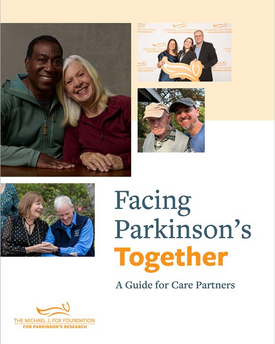

Care partner. Caregiver. Ally. Partner in Parkinson’s. Whatever words you use to describe yourself, you are an essential part of your loved one’s care team.
What Makes a Care Partner?
If you support someone in their Parkinson’s disease journey in any way — emotionally, physically, mentally, spiritually, financially or otherwise — you are a partner in their life and care.
Being a care partner is a role that changes based on relationships, circumstances and time. There’s no standard list of responsibilities or a handbook to follow. But you don’t have to figure it out on your own — and you aren’t alone. Many others are traveling the same road with you.
In Facing Parkinson’s Together: A Guide for Care Partners, we worked with members of our community and experts in movement disorders, psychology and social work to create a resource that covers the spectrum of care partnership, from what makes a care partner to how care partners can take care of themselves.

Facing Parkinson’s Together: A Guide for Care Partners
No matter where you are in your journey, this guide offers helpful tips and practical information for you to use.
-
In this guide, you’ll find tips and advice on:
How care partnership changes over time
Unique life circumstances that can affect care partnership
The emotional aspects of care partnership, and how caring can affect care partners
Communication and asking for what you need
Prioritizing self-care
Navigating the everyday experiences of Parkinson’s
Tips to Support a Loved One with Parkinson’s
Being a care partner means considering for your own well-being while managing the needs of a loved one. In this video, Rachel Dolhun, MD, DipABLM, principal medical advisor at The Michael J. Fox Foundation, shares five tips you can use to support a loved one with Parkinson’s.


This publication was made possible by Acadia Pharmaceuticals. Partner support allows us to furnish high-quality educational content to the Parkinson's community while maintaining our commitment to allocate donor dollars to high-impact research. The Michael J. Fox Foundation is solely responsible for the content in this guide.


